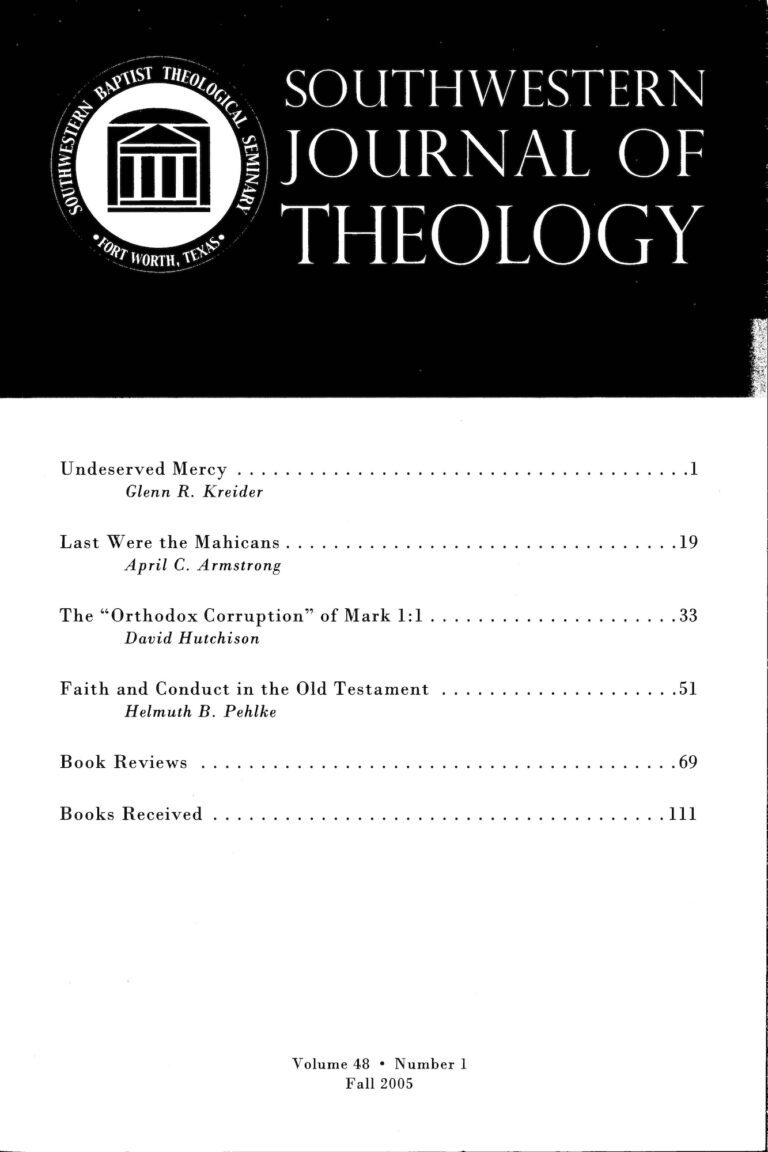
Southwestern Journal of Theology (48.1)
Southwestern Journal of Theology
Volume 48, No. 1 - Fall 2005
Editor: Paige Patterson
Hermeneia. By Ralph W. Klein. Minneapolis: Augsburg Fortress, 2006. 561 pages. Hardcover, $55.00.
The past generation witnessed a renaissance of scholarly inquiry into the distinctive historical and theological emphases of the book of Chronicles. Ralph Klein participated in this movement for over twenty-five years, producing a volume which reflects the distinctive aims of the Hermeneia Old Testament series well.
R. Klein agrees with the majority of recent scholarship on Chronicles, attributing virtually the entire book to the Chronicler, unlike the majority of interpretations throughout the past two centuries which tend to fragment the book by assigning portions of the book to various sources. He asserts that the usual reasons for relegating passages in Chronicles to a secondary status are frequently circular and unpersuasive (11). Likewise, the author does not accept any of the extreme suggestions for dating the book, some of which fall as late as 160 B.C. He finds no substantive evidence for dating 1 Chronicles to the post-exilic epoch, suggesting that the book hailed from the hand of the Chronicler during the first half of the fourth century B.C.
The commentator faces the perennial questions about the historical value of 1 Chronicles squarely, thoroughly surveying critical thought beginning with de Wette at the beginning of the eighteenth century to the present. Generally, R. Klein shows notable deference to the reliability of the biblical text, particularly when compared to the past two centuries of critical analyses. When questions concerning the accuracy of the text arise, 1 Chronicles, frequently offers a variety of explanations to validate the book of Chronicles. At times the commentator claims that the Chronicler rearranged the material he received in order to impress upon his readers a particular theological point (compare 1 Chronicles 9 with Neh. 11:1-19; p. 25). As a respected textual critic, R. Klein catalogs additional places where he attributes differences to divergent Hebrew text types for Samuel—Kings compared to that for Chronicles (32-37). Despite it’s sensitivity to text critical concerns, 1 Chronicles consistently refrains from emending the Hebrew text (for example, 222, 250).
When assessing the synoptic issues, R. Klein contends that the Chronicler expects his readers to recall the full account of Samuel-Kings, particularly in those passages where he omits significant details included in the earlier biblical accounts. In those places where 1 Chronicles offers information found nowhere else in the Old Testament, the commentator typically eschews denigrating the value of the Chronicler’s work. Frequently, R. Klein argues that the Chronicler had access to a host of historical sources which did not survive the ages (for example, 1 Chron. 2:3—4:23; p. 88). At times the commentary simply outlines genealogies which differ from one another without any attempt at harmonization (see the treatment of the parallel accounts in Gen. 46:10; Exod. 6:15; Num. 26:12-14; and 1 Chron. 4:24; p. 146). Accordingly, 1 Chronicles presents a helpful overview of the theological emphases of the book (44-48). The author approvingly cites Steven McKenzie’s assessment that Chronicles comprises “a theological rewriting of Bible history for instructional purposes” (19). On other issues, R. Klein reaches more negative conclusions.
While the author demonstrates greater confidence in the veracity of 1 Chronicles than most scholars, unfortunately he identifies numerous passages which he rejects as unhistorical or otherwise unreliable. For instance, he concludes that the time frame allowed in the Jbook cannot be accurate at places within 1 Chronicles (see 13:13-14). Moreover, he disavows any historical accuracy to 1 Chron. 27:16-24 whatsoever.
1 Chronicles analyzes the genealogies in the biblical book by drawing a distinction between “segmented” and “linear” genealogies. According to R. Klein’s understanding, “segmented genealogies” merely express the individual’s social status and duties through the metaphor of kinship ties (21). Similarly, he claims that “linear genealogies” present persons or groups from previous eras simply to buttress claims to power or property (21). For example, R. Klein contends that Chronicles presents social inferiors as “children,” while superiors appear in the genealogies as “parents” (21). As such, R. Klein contends that these segmented genealogies do not accurately portray familial relationships as claimed by the book of Chronicles. The conclusion that the Chronicler’s genealogies convey little more than a person’s social status mars the benefits of the commentary’s genealogical analyses.
Such pessimistic assertions contrast with the commentator’s typical efforts to accept and to explain the received text of 1 Chronicles. Recognizing these concerns about the commentator’s handling of several important issues, anyone studying 1 Chronicles carefully should work through R. Klein’s study. The volume often yields great assistance.





